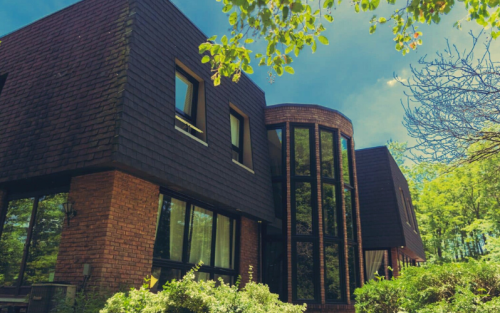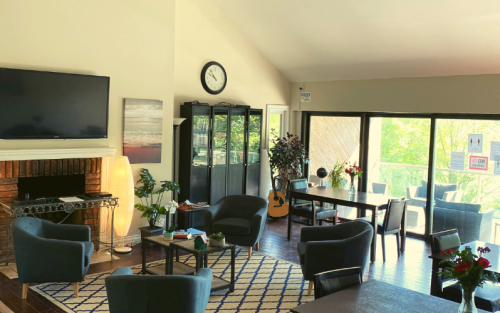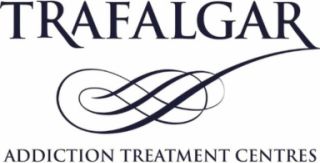






Trafalgar Addiction Treatment Centres
Verified Center
This provider's information has been quality-checked by Recovery.com's Research Team for accuracy and completeness, including center verification through appropriate third-party organizations.
Treatment Focus
This center treats substance use disorders and co-occurring mental health conditions. Your treatment plan addresses each condition at once with personalized, compassionate care for comprehensive healing.
Primary Level of Care
Offering intensive care with 24/7 monitoring, residential treatment is typically 30 days and can cover multiple levels of care. Length can range from 14 to 90 days typically.
Treatment Focus
This center treats substance use disorders and co-occurring mental health conditions. Your treatment plan addresses each condition at once with personalized, compassionate care for comprehensive healing.
Primary Level of Care
Offering intensive care with 24/7 monitoring, residential treatment is typically 30 days and can cover multiple levels of care. Length can range from 14 to 90 days typically.
Provider's Policy
We accept payments through insurance companies that cover non-provincially funded inpatient or virtual addiction treatment. However, it is the responsibility of the individual or payor to confirm with their insurance provider whether our services are covered under their policy and the extent of that coverage.
Trafalgar Addiction Treatment Centres
Trafalgar Addiction Treatment Centres
About Trafalgar Addiction Treatment Centres
Trafalgar Addiction Treatment Centres treats substance addictions with a personalized and holistic approach, giving attention to mental health conditions and co-occurring disorders. We offer medically supervised detox to stabilize for treatment, and group and individual therapy led by masters-level therapists.
You didn’t choose addiction, but you can choose a better recovery experience. Stay in a cozy home-like environment where treatment is tailored just for you, not in a cold and depersonalized setting. Book a tour today! With no wait times, you can start your recovery journey now.
Premium Recovery Care, Without the Premium Price
Trafalgar’s accredited inpatient treatment program begins with medically supervised withdrawal management. This allows for steady integration into treatment at the best time for the client’s success. Their inpatient treatment centre welcomes clients for a minimum of 42 days. During treatment, clients have access to addictions counsellors (many of whom are in recovery themselves), individual therapy sessions, multifaceted group therapy, and wellness options.
In addition to inpatient rehab treatment, Trafalgar offers a unique and accessible virtual outpatient program, providing both aftercare services and a fully online treatment alternative.
Wellness And Aftercare
Clients at Trafalgar enjoy a variety of wellness supports including an on-site fitness centre, hiking trails, volleyball, art therapy, and well-balanced meals prepared by on-site chefs.
After their treatment stay is completed, clients have access to aftercare services such as aftercare groups that meet weekly, both onsite and virtually. For one month after treatment, clients also can connect with their addiction counsellor weekly to check in, discuss their transition from treatment and the early challenges of recovery, and reflect on the skills they have developed. Clients have access to additional aftercare options, offered virtually at an additional cost.

Highlights from the Center
Highlights
These highlights are provided by and paid for by the center.
Holistic Approach
Trauma-Informed Care
Accredited
Center Overview
Treatment Focus
This center treats substance use disorders and co-occurring mental health conditions. Your treatment plan addresses each condition at once with personalized, compassionate care for comprehensive healing.
CARF Accredited
CARF stands for the Commission on Accreditation of Rehabilitation Facilities. It's an independent, non-profit organization that provides accreditation services for a variety of healthcare services. To be accredited means that the program meets their standards for quality, effectiveness, and person-centered care.

Insurance Accepted
Cash Pay Rates
Estimated Cash Pay Rate
Center pricing can vary based on program and length of stay. Contact the center for more information. Recovery.com strives for price transparency so you can make an informed decision.
Luxury rehab centers offer a unique blend of luxurious amenities and high-quality treatment. From private suites to gourmet dining, personal trainers to spa treatments, these facilities provide a high level of comfort and discretion.

Meet Your Care Team

Amy Alberi
Executive Director

Valentino Colavecchia
Clinical Manager

Angela Hall
Manager of Operations and Client Experience

Gillian Saunders-Drutz
Executive Director, Virtual Program
MSW, RSW, CSAT (Q)




Levels of Care







Your Care Options
Specializations
Alcohol
Using alcohol as a coping mechanism, or drinking excessively throughout the week, signals an alcohol use disorder.
Detox
Detox fully and safely removes toxic substances from the body, allowing the next steps in treatment to begin with a clean slate.
Co-Occurring Disorders
A person with multiple mental health diagnoses, such as addiction and depression, has co-occurring disorders also called dual diagnosis.
Drug Addiction
Drug addiction is the excessive and repetitive use of substances, despite harmful consequences to a person's life, health, and relationships.
Evidence-Based
A combination of scientifically rooted therapies and treatments make up evidence-based care, defined by their measured and proven results.
Holistic
A non-medicinal, wellness-focused approach that aims to align the mind, body, and spirit for deep and lasting healing.
Trauma
Some traumatic events are so disturbing that they cause long-term mental health problems. Those ongoing issues can also be referred to as "trauma."
Who We Treat
LGBTQ+
Addiction and mental illnesses in the LGBTQ+ community must be treated with an affirming, safe, and relevant approach, which many centers provide.
Men and Women
Men and women attend treatment for addiction in a co-ed setting, going to therapy groups together to share experiences, struggles, and successes.
Midlife Adults
For adults ages 40+, treatment shifts to focus on the unique challenges, blocks, and risk factors of their age group, and unites peers in a similar community.
Mild Disabilities
Adults with mild physical or intellectual disabilities receive treatment catered to their specific needs in a safe and clinically supportive environment.
Pregnant Women
Addiction and mental health treatment meets the clinical and psychological needs of pregnant women, ensuring they receive optimal care in all areas.
Professionals
Busy, high-ranking professionals get the personalized treatment they need with greater accommodations for work, privacy, and outside communication.
Veterans
Patients who completed active military duty receive specialized treatment focused on trauma, grief, loss, and finding a new work-life balance.
Approaches
Evidence-Based
A combination of scientifically rooted therapies and treatments make up evidence-based care, defined by their measured and proven results.
Holistic
A non-medicinal, wellness-focused approach that aims to align the mind, body, and spirit for deep and lasting healing.
Individual Treatment
Individual care meets the needs of each patient, using personalized treatment to provide them the most relevant care and greatest chance of success.
Personalized Treatment
The specific needs, histories, and conditions of individual patients receive personalized, highly relevant care throughout their recovery journey.
Therapies
Trauma-Specific Therapy
This form of talk therapy addresses any childhood trauma at the root of a patient's current diagnosis.
Family Therapy
Family therapy addresses group dynamics within a family system, with a focus on improving communication and interrupting unhealthy relationship patterns.
Relapse Prevention Counseling
Relapse prevention counselors teach patients to recognize the signs of relapse and reduce their risk.
Solution Focused, Goal-Oriented Therapy
A quick goal-oriented therapy that helps patients identify their current and future goals, find out how to achieve them, and empower future problem-solving.
Substances We Treat
Alcohol
Using alcohol as a coping mechanism, or drinking excessively throughout the week, signals an alcohol use disorder.
Benzodiazepines
Benzodiazepines are prescribed to treat anxiety and sleep issues. They are highly habit forming, and their abuse can cause mood changes and poor judgement.
Chronic Relapse
Consistent relapse occurs repeatedly, after partial recovery from addiction. This condition requires long-term treatment.
Co-Occurring Disorders
A person with multiple mental health diagnoses, such as addiction and depression, has co-occurring disorders also called dual diagnosis.
Cocaine
Cocaine is a stimulant with euphoric effects. Agitation, muscle ticks, psychosis, and heart issues are common symptoms of cocaine abuse.
Drug Addiction
Drug addiction is the excessive and repetitive use of substances, despite harmful consequences to a person's life, health, and relationships.
Ecstasy
Ecstasy is a stimulant that causes intense euphoria and heightened awareness. Abuse of this drug can trigger depression, insomnia, and memory problems.
Heroin
Heroin is a highly addictive and illegal opioid. It can cause insomnia, collapsed veins, heart issues, and additional mental health issues.
Languages
Aftercare
Care Designed for Your Needs
Personal Amenities
Amenities
Special Considerations
Gender-specific groups
Patients in gender-specific groups gain the opportunity to discuss challenges unique to their gender in a comfortable, safe setting conducive to healing.
Healthy Meals are provided
Great food meets great treatment, with providers serving healthy meals to restore nutrition, wellbeing, and health.
First Responders Program
Paramedics, police officers, firefighters, and others join in a specific First Responders program, usually focused on trauma, grief, and work-life balance.
Activities
Yoga
Yoga is both a physical and spiritual practice. It includes a flow of movement, breathing techniques, and meditation.

What people are saying
Treatment
4.7
Accommodations
4.5
Food & Nutrition
5.0
Value
4.2
K.K.
Treatment in 2024 • (45 days) • Reviewed 07/19/25
Former Client
•Self employed
•Ontario
James N (N8VCHEF)
Treatment in 2025 • (14 days) • Reviewed 07/30/25
Former Client
Mady
Treatment in 2024 • (42 days) • Reviewed 07/19/25
Former Client





